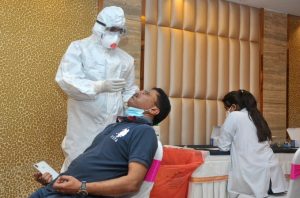States Must Conduct Sero Surveys: NITI Aayog Health Official
This period of decline in cases must be used to better prepare ourselves for a third wave, which includes state and national sero surveys.
Submitting weekly data of Covid-19 cases at a press briefing on Friday, eminent health officials suggested that the state governments should use this period of decline in cases to conduct sero surveys, which may help get a better understanding of how far the infection has spread in the country.
the state governments should use this period of decline in cases to conduct sero surveys, which may help get a better understanding of how far the infection has spread in the country.
Dr VK Paul, Health Committee Member, NITI Aayog recommended using state-based sero surveys to capture and contain the spread of the virus in particular hotspots, so that regions located outside the said areas can have a free flow of movement.
“Since Covid-19 cases have been declining in the last 30 days, work needs to be done on governance levels. We must conduct sero surveys in this gap to understand the intensity and reach of the infection. States, sub-states, districts, etc., need to work on this the most. This preparation is necessary to keep ourselves ready for the third wave of the virus,” he added.
The Indian Council of Medical Research will also be conducting a national sero-survey this month. This will be the apex medical body’s third sero survey since the onset of the Covid-19 pandemic, and will be held across 70 districts and 21 states. It will also include children aged 6 years and above. “However, all states should be encouraged to conduct sero surveys in their own geographies, and we cannot depend on one national survey to give us all the data. The states must take this time and work on surveillance studies,” Dr Paul added.
Also Read : COVID-19 Pandemic May Have Been Caused by a “Lab Leak”
The think tank member also suggested governments to prepare their medical infrastructure during this gap and be prepared for a third wave.
Sero surveys are studies based on sample collection that establish the scale of populations affected by infectious diseases, herein, Covid-19. The test is performed by acquiring blood serum of an individual after an antibody test, or a serology test. The sero survey analyses an individual’s immune system to check if it has produced bodies necessary to deflect the infection.
The officials also raised concerns about the wastage of vaccine doses and stressed the need for people to also take their second vaccine. As of June 11th, only 69 lakh of the 1 crore health care workers have taken their second vaccine dose. The ratio is even lower for frontline workers, with only 88 lakhs of the 1.65 crore have taken their second jab. “We highly encourage citizens to somehow take their second dose. There are vases of vaccine hesitancy and so we need to create a buzz about vaccination, encourage more people to take it,” Health Ministry Joint Secretary, Lav Agarwal, said.
He further added that the government has been working on a war-footing to ensure that vaccines in India are supplied at the same time as they are in countries abroad, thus ensuring that India does not lag behind “as it has in the past,” echoing the statement made by Prime Minister Narendra Modi last week.
“We have cutting edge technology in vaccine production now, which has led to increase in supply. Pharmaceutical labs here have been able to develop an mRNA technique for vaccine production, which can be extremely useful in case of Covid-19 variants,” Dr Paul said, adding that such developments have increased the country’s political might.
On Friday, India reported 51,702 fresh Covid-19 cases, which is proof of the declining cases. There has been a continuous decline in cases since the last five weeks. These figures have come down by 78%, when compared to the peak. India has witnessed less than 1 lakh cases for the last four days, which signals towards an overall decline in infections.
“The number of active cases is also lowest in two months. The strain on healthcare infrastructure has reduced. The recovery rate in cases has also been increasing,” Dr Agarwal added.
